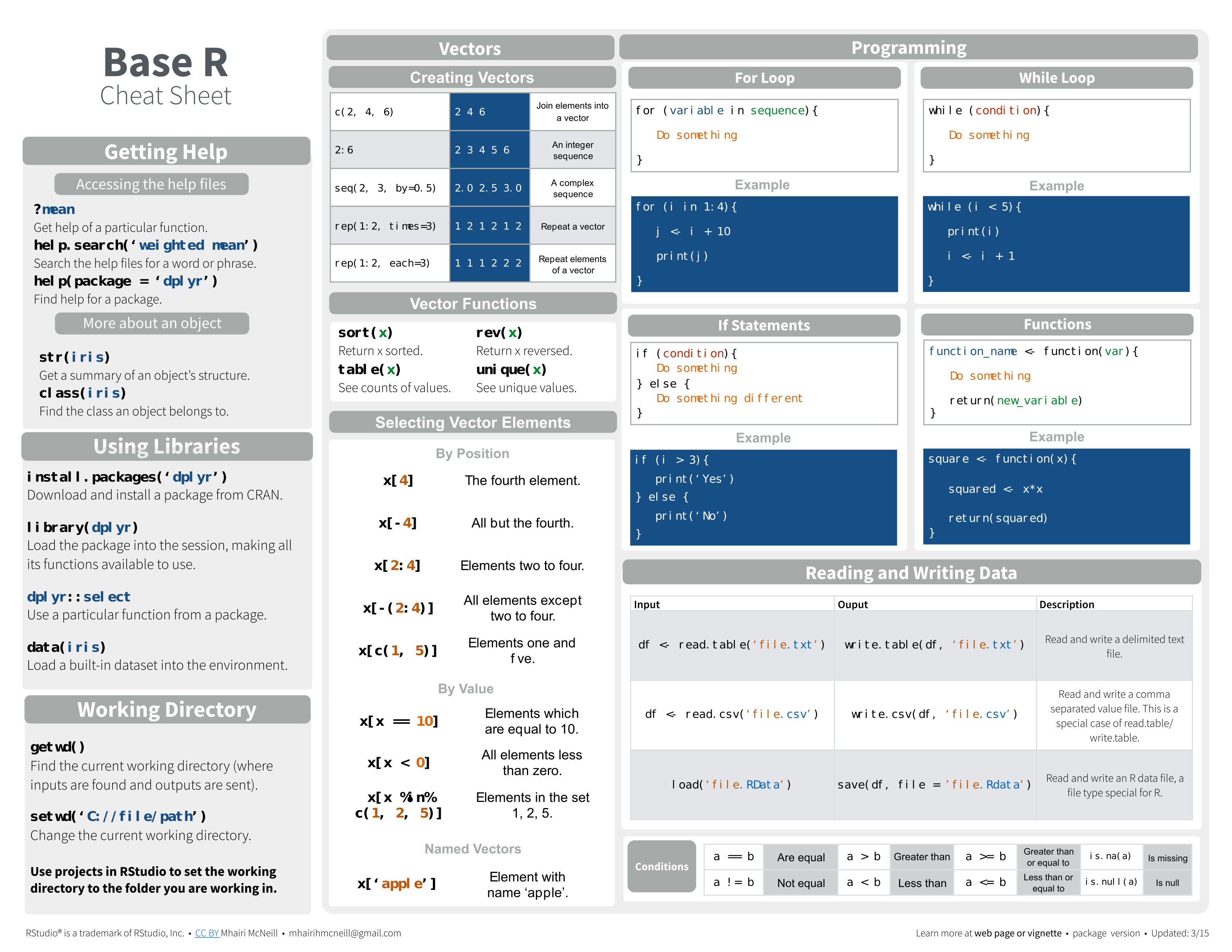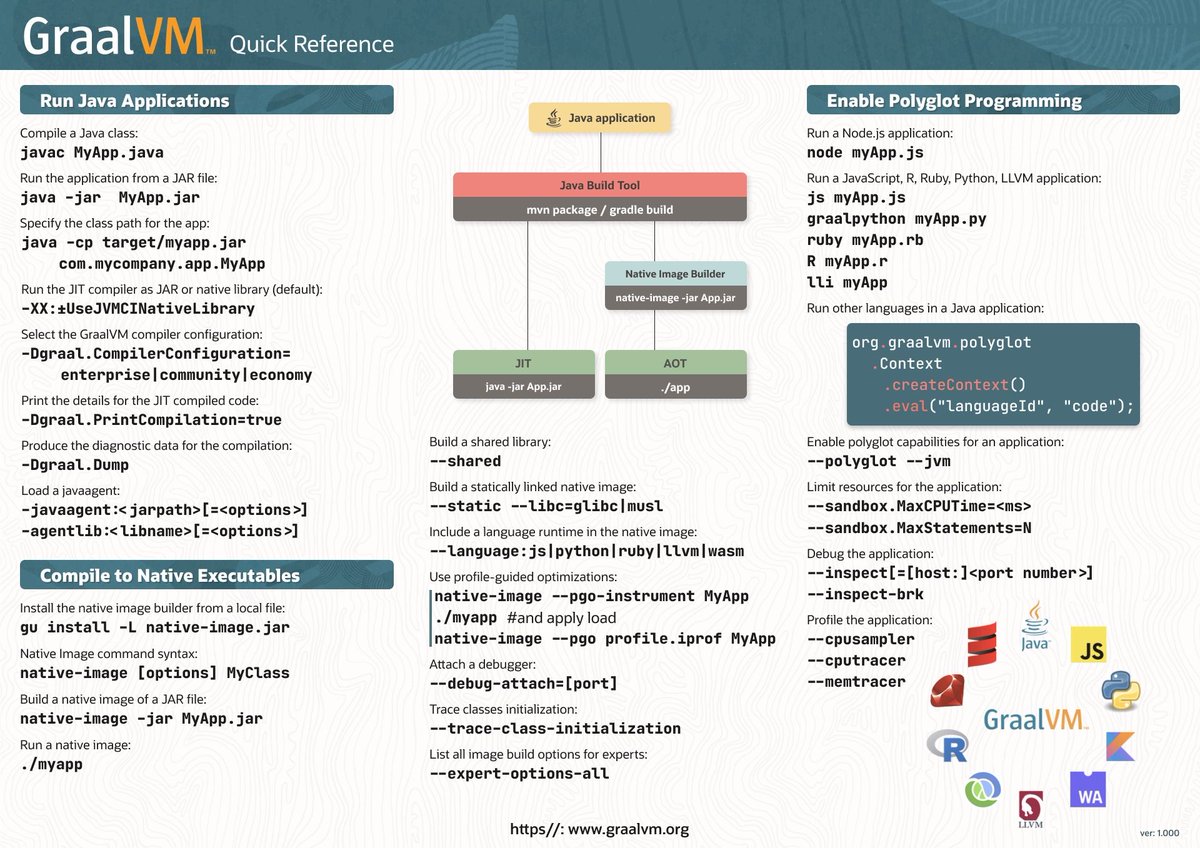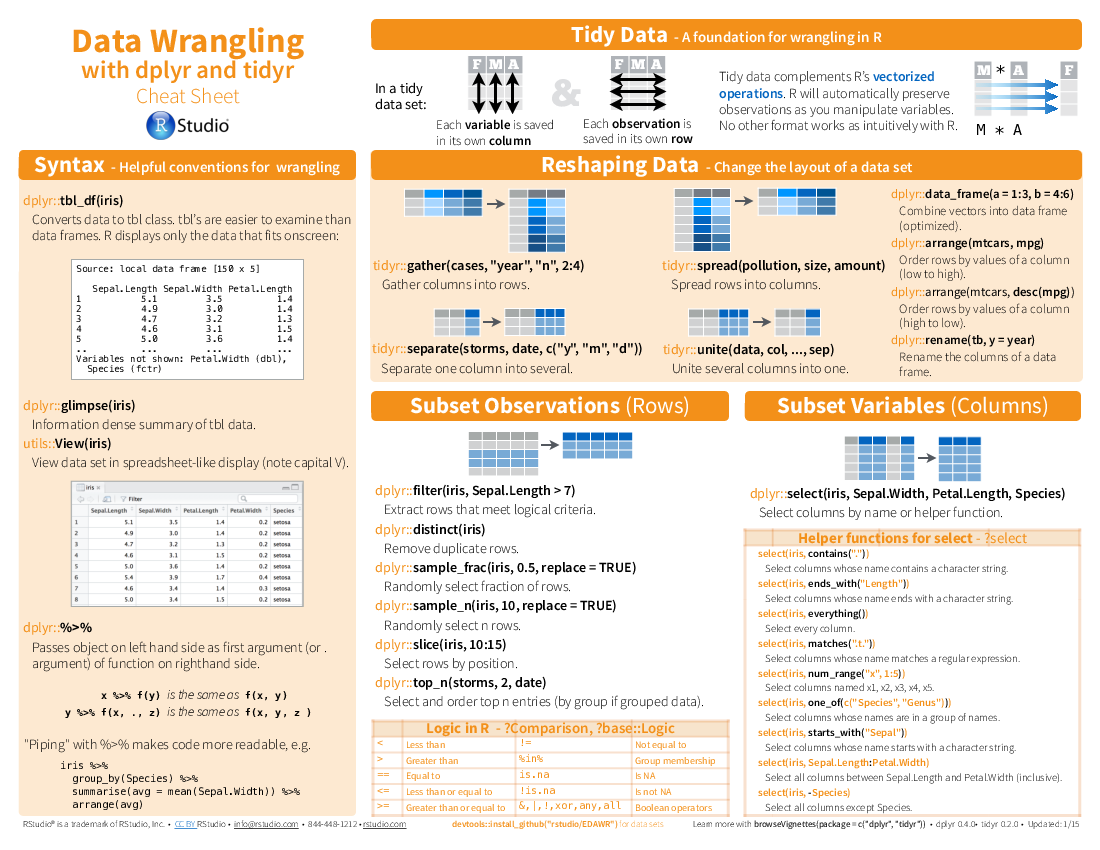

R Style Guide - This resource is more than a cheat sheet. Google's internal R user community put together this guide for clean R code that covers syntax & conventions that are unique to R. I include it here because I've refered to it quite a bit in my own work. Your code will be easy to read & maintain if you follow these guidelines. R is more than just a statistical programming language. It’s also a powerful tool for all kinds of data processing and manipulation, used by a community of programmers and users, academics, and practitioners. But in order to get the most out of R, you need to know how to access the R Help files and. A cheat sheet is a condensed help file with the basic syntax and a short explanation for the certain command. Example: The common help for the easy and useful command “strsplit” to separate parts of a string from each other.
Thanks to Brendan O’Connor, this cheatsheet aims to be a quick reference of Scala syntactic constructions. Licensed by Brendan O’Connor under a CC-BY-SA 3.0 license.
| variables | |
Good | Variable. |
Bad | Constant. |
| Explicit type. | |
| functions | |
| Good Bad | Define function. Hidden error: without = it’s a procedure returning Unit; causes havoc. Deprecated in Scala 2.13. |
| Good Bad | Define function. Syntax error: need types for every arg. |
| Type alias. | |
| vs. | Call-by-value. Call-by-name (lazy parameters). |
| Anonymous function. | |
| vs. | Anonymous function: underscore is positionally matched arg. |
| Anonymous function: to use an arg twice, have to name it. | |
| Anonymous function: block style returns last expression. | |
| Anonymous functions: pipeline style (or parens too). | |
| Anonymous functions: to pass in multiple blocks, need outer parens. | |
| Currying, obvious syntax. | |
| Currying, obvious syntax. | |
| Currying, sugar syntax. But then: | |
| Need trailing underscore to get the partial, only for the sugar version. | |
| Generic type. | |
| Infix sugar. | |
| Varargs. | |
| packages | |
| Wildcard import. | |
| Selective import. | |
| Renaming import. | |
Import all from java.util except Date. | |
| At start of file: Packaging by scope: Package singleton: | Declare a package. |
| data structures | |
Tuple literal (Tuple3). | |
| Destructuring bind: tuple unpacking via pattern matching. | |
| Bad | Hidden error: each assigned to the entire tuple. |
| List (immutable). | |
| Paren indexing (slides). | |
| Cons. | |
| same as | Range sugar. |
| Empty parens is singleton value of the Unit type. Equivalent to void in C and Java. | |
| control constructs | |
| Conditional. | |
same as | Conditional sugar. |
| While loop. | |
| Do-while loop. | |
| Break (slides). | |
same as | For-comprehension: filter/map. |
same as | For-comprehension: destructuring bind. |
same as | For-comprehension: cross product. |
For-comprehension: imperative-ish.sprintf style. | |
| For-comprehension: iterate including the upper bound. | |
| For-comprehension: iterate omitting the upper bound. | |
| pattern matching | |
| Good Bad | Use case in function args for pattern matching. |
| Bad | v42 is interpreted as a name matching any Int value, and “42” is printed. |
| Good | `v42` with backticks is interpreted as the existing val v42, and “Not 42” is printed. |
| Good | UppercaseVal is treated as an existing val, rather than a new pattern variable, because it starts with an uppercase letter. Thus, the value contained within UppercaseVal is checked against 3, and “Not 42” is printed. |
| object orientation | |
Constructor params - x is only available in class body. | |
| Constructor params - automatic public member defined. | |
| Constructor is class body. Declare a public member. Declare a gettable but not settable member. Declare a private member. Alternative constructor. | |
| Anonymous class. | |
| Define an abstract class (non-createable). | |
| Define an inherited class. | |
| Inheritance and constructor params (wishlist: automatically pass-up params by default). | |
| Define a singleton (module-like). | |
| Traits. Interfaces-with-implementation. No constructor params. mixin-able. | |
| Multiple traits. | |
| Must declare method overrides. | |
| Create object. | |
| Bad Good | Type error: abstract type. Instead, convention: callable factory shadowing the type. |
| Class literal. | |
| Type check (runtime). | |
| Type cast (runtime). | |
| Ascription (compile time). | |
| options | |
| Construct a non empty optional value. | |
| The singleton empty optional value. | |
| but | Null-safe optional value factory. |
| same as | Explicit type for empty optional value. Factory for empty optional value. |
| Pipeline style. | |
| For-comprehension syntax. | |
| same as | Apply a function on the optional value. |
| same as | Same as map but function must return an optional value. |
| same as | Extract nested option. |
| same as | Apply a procedure on optional value. |
| same as | Apply function on optional value, return default if empty. |
| same as | Apply partial pattern match on optional value. |
| same as | true if not empty. |
| same as | true if empty. |
| same as | true if not empty. |
| same as | 0 if empty, otherwise 1. |
| same as | Evaluate and return alternate optional value if empty. |
| same as | Evaluate and return default value if empty. |
| same as | Return value, throw exception if empty. |
| same as | Return value, null if empty. |
| same as | Optional value satisfies predicate. |
| same as | Optional value doesn't satisfy predicate. |
| same as | Apply predicate on optional value or false if empty. |
| same as | Apply predicate on optional value or true if empty. |
| same as | Checks if value equals optional value or false if empty. |
R Syntax Cheat Sheet Printable

R Syntax Cheat Sheet

R Syntax Cheat Sheet Example
The syntax, so that (?U)a. is lazy and (?U)a.? Regular expressions can be made case insensitive using (?i). In backreferences, the strings can be converted to lower or upper case using L or U (e.g. This requires PERL = TRUE. CC BY Ian Kopacka. ian.kopacka@ages.at Regular expressions can conveniently be. R Reference Card by Tom Short, EPRI PEAC, tshort@epri-peac.com 2004-11-07 Granted to the public domain. See www.Rpad.org for the source and latest.

